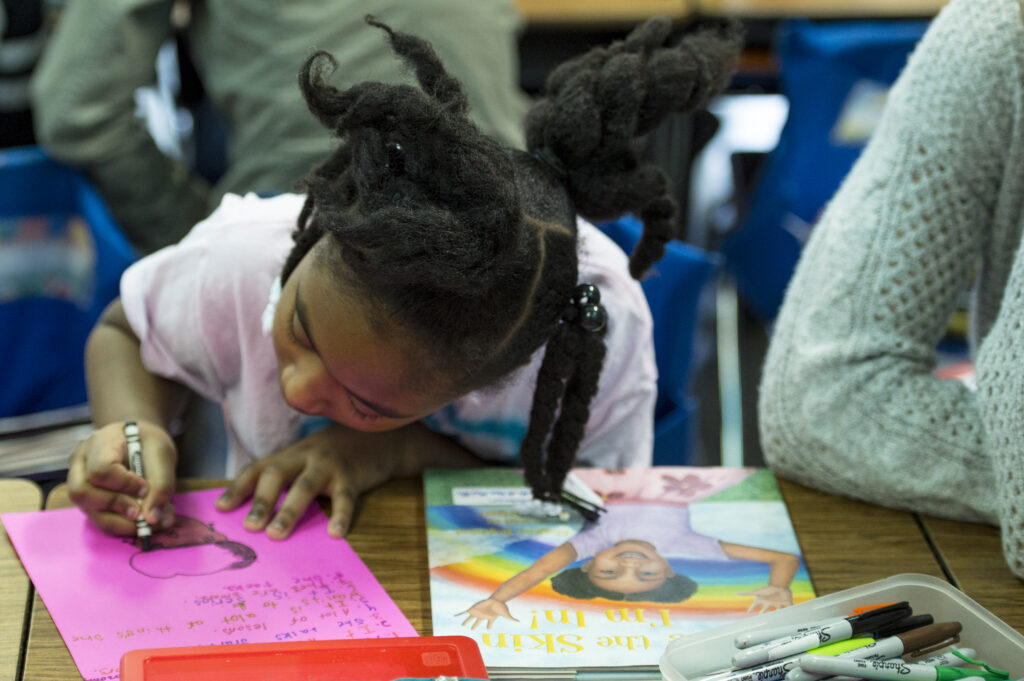This piece was written by NCTE member Wintre Foxworth Johnson, reprinted with permission from EdWeek.
In the last stanzas of the 1926 poem “I, too,” Langston Hughes writes: “Tomorrow, / I’ll be at the table / When company comes. / Nobody’ll dare / Say to me, / ‘Eat in the kitchen,’ / Then. / Besides, / They’ll see how beautiful I am / And be ashamed— / I, too, am America.”
This sentiment remains relevant for Black people today, as K-12 schools continue to grapple with how to best (or even at all) integrate Black history into social studies and language arts curricula. Too often, this essential content is relegated to metaphorically “eat in the kitchen” by only being introduced during Black History Month. The integration of Black history into U.S. core curricula is a missed opportunity in elementary school, a period in young children’s development during which there is boundless potential to nurture their creativity.
As the push to suppress marginalized people’s histories, stories, and lived experiences continues across the country, it has become all the more urgent to preserve, protect, and amplify Black history narratives in schools. Early elementary—grades K through 2—is a particularly fertile time for children to learn about and explore these stories, making elementary educators critical in raising students’ consciousness and working toward racial justice. Moreover, an expansive exploration of Black history in elementary schools can be used to ignite children’s ingenuity and investment in school.
There is no manual or checklist for how elementary schools can eschew a Eurocentric approach to learning. However, to elevate, center, and value Black children’s lives and perspectives, educators must begin with a deep commitment to humanizing, amplifying, and honoring Black history. Elementary teachers must be willing—and trained—to suspend the conventional notions of knowledge building and content mastery, sincerely appreciate the brilliance Black students bring to the classroom, and be willing to continue learning themselves. Only then will schools be able to provide a liberatory education.
Many U.S. elementary teachers and administrators fail to believe in Black children’s intelligence and refuse to center Black histories. Children can be central to curriculum development and implementation—thinking alongside one another and the classroom teacher, uncovering and recounting historical narratives that they find relevant and enriching, and documenting their own voices. They can write poetry, design a textbook, pose a question of concern about their community, and generate a multimodal (audio, visual, and/or written) project that proposes solutions.
Before we meaningfully integrate Black people’s stories and narratives into elementary schools, we must recognize that Black children are themselves knowledge holders and generators. As such, the sociopolitical knowledge Black students already possess should serve as the foundation for facilitating teaching and learning. As naturally inquisitive beings, children can meaningfully inform curriculum and challenge schools to be more equitable.
If provided the opportunity to enact agency in their classrooms, children can take on this role of curriculum shapers, whose perspectives matter for what and how they learn. This opportunity is especially significant for Black children who are engaging Black histories that have traditionally been omitted in schools.
In U.S. schools, Black history is often flattened to focus primarily on enslavement, the civil rights movement, and, more recently, the election of President Barack Obama. Elementary schools tend to elevate the lives of well-known individual Black historical giants like Harriet Tubman, Rosa Parks, and the Rev. Martin Luther King, Jr., while ignoring myriad other Black people—lesser known, unsung heroes—who have worked for racial justice. Furthermore, narratives of oppression, dehumanization, and anti-Blackness take precedence over Black people’s beauty, joy, and intellect.
Elementary curricula should also include concentrated periods of creation within Black communities throughout U.S. history. Teaching about the Harlem Renaissance and the Black Arts Movement of the 1960s and 1970s, for example, can enhance the incomplete Black histories that are predominately taught.
What makes these artistic movements ripe for teaching young children? They are models of times when creative expression—be it literature, visual arts, music, or theater—celebrated the richness of Black life, affirmed the humanity of Black people, and centered Black resistance to white supremacy and Black liberation. Black cultural production across time can serve as a model for imagination, artistic expression, and innovation, as well as racial justice.
We continue to wait for “tomorrow” to be “at the table,” in the words of Langston Hughes. Black children deserve an education that validates their existence and nurtures their sociopolitical sensibilities. They deserve curriculum that fully accounts for the beauty and ingenuity of their ancestors.
As inequity persists and anti-Blackness abounds, early educators must bring Black history and cultural production to the forefront of how Black children make sense of themselves and society in the classroom. In doing so, we can reimagine elementary schools as spaces that sustain Black students’ identities—making those identities the source from which we should derive standards, learning objectives, and lesson plans.
 Wintre Foxworth Johnson, PhD, is an assistant professor in the Department of Curriculum, Instruction, and Special Education at the University of Virginia’s School of Education and Human Development. Johnson is a former NCTE Cultivating New Voices among Scholars of Color (CNV) fellow. She was awarded the 2022 Language Arts Distinguished Article Award for her piece titled “History Is a Way of Building Identity: How One Independent Neighborhood Elementary School Uses Black Cultural Movements to Engage Children’s Sociopolitical Perspectives.”
Wintre Foxworth Johnson, PhD, is an assistant professor in the Department of Curriculum, Instruction, and Special Education at the University of Virginia’s School of Education and Human Development. Johnson is a former NCTE Cultivating New Voices among Scholars of Color (CNV) fellow. She was awarded the 2022 Language Arts Distinguished Article Award for her piece titled “History Is a Way of Building Identity: How One Independent Neighborhood Elementary School Uses Black Cultural Movements to Engage Children’s Sociopolitical Perspectives.”
It is the policy of NCTE in all publications, including the Literacy & NCTE blog, to provide a forum for the open discussion of ideas concerning the content and the teaching of English and the language arts. Publicity accorded to any particular point of view does not imply endorsement by the Executive Committee, the Board of Directors, the staff, or the membership at large, except in announcements of policy, where such endorsement is clearly specified.

